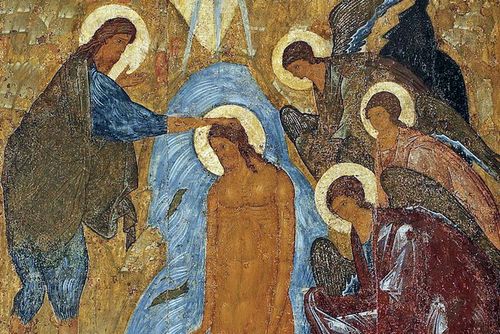Scripture Menu
1 Kings — A Sudden Appearance
Now Elijah the Tishbite, of Tishbe in Gilead, said to Ahab, “As the LORD, the God of Israel, lives, before whom I stand, there shall be neither dew nor rain these years, except by my word.”
Mark 1:2-4— Another Sudden Appearance
It is written in Isaiah the prophet, “Behold, I send my messenger before your face, who will prepare your way, the voice of one crying in the wilderness: 'Prepare the way of the Lord, make his paths straight,'” John appeared, baptizing in the wilderness and proclaiming a baptism of repentance for the forgiveness of sins.
Cogitations—
Most students of the Bible understand that in the Gospels, John the Baptist is identified with the prophet Elijah. Jesus himself makes this one-to-one correlation in Matthew 11: “Truly, I say to you, among those born of women there has arisen no one greater than John the Baptist… For all the Prophets and the Law prophesied until John, and if you are willing to accept it, he is Elijah who is to come” (11:11, 13-14). Let’s ponder the connection between those Old Testament prophets and the New Testament version of that duo (John the Baptist and Jesus).
As I’ve mentioned a few times before, Elijah enters in the middle the Story of God’s People. They came into the Promised Land through Jordan with Joshua. That “conquest” to make the Land holy was not completed. Many people in the Land remained, and there were many other “dropped balls” along the way. Complicating the picture, there were twelve disparate tribes of Jacob knowing they were theoretically and theologically one but comporting themselves with a generous measure of independence. Prime examples abound: The period of the Judges comes. The early ominous seeds of monarchy in Saul. The disappointing potential with David and Solomon. The stream of unfaithful kings and their idolatry-prone subjects, north and south. In all this, they would not be as they were called to be— a “kingdom of priests and a holy nation” (Exodus 19:6).
But the defining rock bottom moment climaxes with the House of Omri and the anti-Solomonic son, King Ahab. This king, via his Canaanite princess, incorporates a new religion into the People of God: Baal worship, Baal ethics, Baal priesthood, and a temple to Baal he constructed in his capital city of Samaria.
It is after these words of temple building at the end of 1 Kings 16 that we have the sudden, out-of-nowhere appearance of Elijah in 1 Kings 17. Elijah comes at a critical time in the history of God’s People in the Land. The acorn has fallen far from the tree. Elijah comes with warning and exhortation. He does “battle” with King Ahab and his god, Baal— beginning here in chapter 17 and ultimately ending on Mount Carmel in an epic showdown. Nevertheless, Elijah is destined to be a mere precursor of a greater salvation coming from God. That would be Elisha, of course. Elisha will take the anointing and set upon a ministry of a different kind of “conquest”—bringing life to reconquer the Promised Land. Theologically, to bring the People of God back to Eden.
In the end, hard hearts and deaf ears prevail, even with the extraordinary efforts of two mighty prophets, Elijah and Elisha. Exile comes to both kingdoms, north and south, bringing 400 years of prophetic silence. Assyrians, Babylonians, Greeks, and Romans rule the Holy Land in the interim.
Despite the prevailing darkness, the prophet Malachi, whose prophecies bring the Old Testament to a close, announces that there will be another Elijah to come to end the darkness and the silence – (4:5-6) “Behold, I will send you Elijah the prophet before the great and awesome day of the LORD comes. And he will turn the hearts of fathers to their children and the hearts of children to their fathers, lest I come and strike the land with a decree of utter destruction.”
Malachi had hinted at this Elijah – (3:1) “Behold, I send my messenger, and he will prepare the way before me. And the Lord whom you seek will suddenly come to his temple; and the messenger of the covenant in whom you delight, behold, he is coming, says the LORD of hosts.”
This coming “Elijah” will not just anoint another prophet like himself. The anointed Elisha this time will be God himself: “he will prepare the way before me. And the Lord whom you seek will suddenly come to his temple…”
This was fulfilled with the sudden appearance John the Baptist from the wilderness, like Elijah. And like that Elijah, this new Elijah comes to purify the people of God and put them back on its feet, thus preparing it definitively this time for the arrival of the new Elisha, the Lord himself.
Elijah came to a god-less ruler in Ahab, with the People of God far from God in heart and mind. John the Baptist came to battle yet another god-less ruler in Herod Antipas, and to reach a lost people like stray sheep in need of a Shepherd.
Both entries of “Elijah” in the Old and New Testaments begin the same way— But this is where the similarities with the Old Testament end. When the new Elijah saw the new Elisha, he exclaimed, “Behold the Lamb of God who takes away the sin of the world!” (John 1:29). With the coming of the Lord Jesus Christ, there has been no failure for the faithful to hear and obey. The Promised Land has not only been “reconquered,” but it has been extended throughout the world, and has embraced many kingdoms. It promises still to expand even more, until the whole world is once again God’s Eden (cf. Revelation 21-22).
When we read through the stories of Elijah and Elisha in this middle portion of 1&2 Kings, just keep in mind that this is an appetizer of what God has in store for the world.


